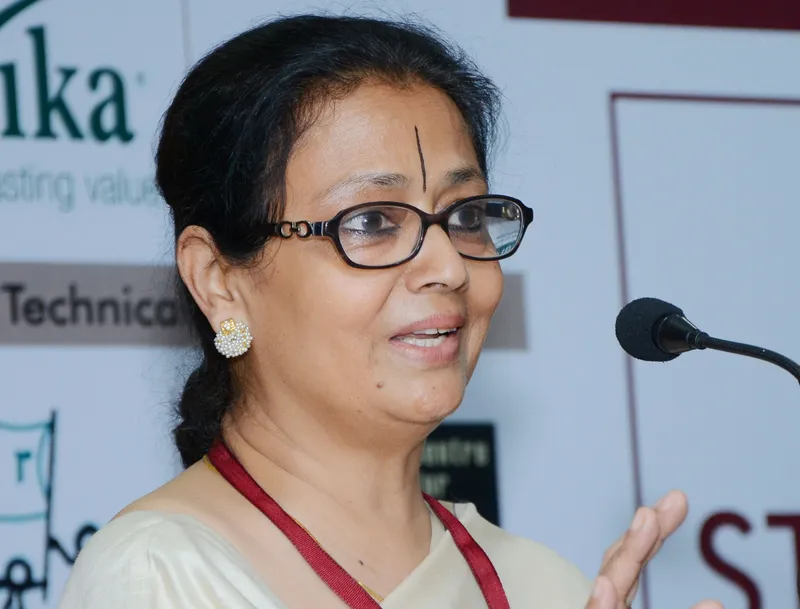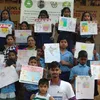How Delhi-based Udayan Care helped over 30,000 children and women through its initiatives
Udayan Care helps children and women become an accountable part of the workforce through its educational and livelihood training programmes.
In a country with a population of 1.3 billion people, about 29.6 million children do not have parents, says a report by UNICEF. According to a study by SOS Children Village in 2011 this number was equivalent to about four percent of India’s child population.
With the adoption rates being abysmally low in the country, NGOs and care homes are looking to provide an alternative care system to take care of these children. One such NGO is Udayan Care.
Founded in 1994 as a public charitable trust by Kiran Modi, Delhi-based Udayan Care works to empower vulnerable children, women, and youth in 27 cities across 15 states of India.

Kiran Modi, Founder and CEO of Udayan Care
Starting with just one, small Ghar (group home) for children without parental care in Delhi in 1996, it has now established 17 group homes and two aftercare programmes to support the disadvantaged groups.
It is also enabling higher education to over 9,000 girls in about 21 cities of India, providing vocational training and livelihood programmes, enabling 16,000 youth for employability. In other words, Udayan Care aims to provide better standards, systems, and processes for children without parental care in an alternative care format.
Volunteer-driven initiatives
The Delhi-based NGO has close to 200 employees, and also has long term volunteers who form almost six times that number. An actively involved board also strengthens governance and compliance as well as drives strategy.
“The Udayan Ghar Programme is based on the belief that a loving home and family is the right of every child. Udayan Ghars are long term, group residential homes that nurture children who are orphaned, abandoned, or at-risk in a family-like environment, and the youth coming out of these homes are nurtured and developed to take their role in the society through its aftercare programmes,” says Kiran. The programme has about 211 children, and the aftercare programmes are looking after 13 young adults.
According to a report by International Labour Organisation (ILO), the female labour force participation stood at a shocking 27.2 percent in 2011-2012 in India.

The heart family: Aftercare youth at Udayan Care Delhi, India share a family like bond.
In order to bring about a change, Udayan introduced its educational programme for girl children through the Udayan Shalini Fellowship Programme (USF) in 2002. The programme targets girls from marginalised backgrounds, who are called Shalinis (dignified, empowered women).
Since inception, USF has supported over 9,000 girls, many of whom are pursuing fields like engineering, medical studies, chartered accountancy, company secretaryship, vocational training, nursing, and computer science, among others.
“My father was not ready to educate me after grade 10. But now he is supporting me in my higher education, thanks to my mentor Deepak Sharma and the USF Greater Noida team,” says Shruti Kumari, one of the Shalinis who has a keen interest in volleyball and wrestling.
“My mentor continuously counselled and guided me to work hard towards fulfilling my dreams. The financial help from USF has assisted me in continuing my studies,” she added.

Women at the flagship programme of Udayan Care’s Shalini Fellowship.
USF also reaches out to disadvantaged women through its skill centres in Noida and Uttarakhand by teaching them stitching and tailoring, beauty therapy, paper craft, enamel work, block printing, graphic design, yoga, digital literacy, Hindi typing, sewing, and other courses. The items made by these women are sold by the organisation under the label ‘Sukriti’.
“With courses like pottery, cookery, and photography, the vision is to provide more career choices to girls and women for their future employability,” Kiran says.
But their efforts go beyond this with computer application courses like Microsoft, Tally, and graphic designing to enable underserved youth and adults to improve their livelihood options through Udayan Care’s Information Technology and Skill Centres.
“Our 14 Information Technology Centres in Delhi-NCR have equipped 17,474 students with the dignity of self-reliance. A new centre in Noida was opened in 2019-20, and enrolled 120 students in 2020-21 with a recent partnership with IBM Skills Build to impart 21st century employability skills online,” details Kiran.
Udayan has been supported by organisations from India and around the world, including Genpact, ASOS, iPartner India, UNICEF, MG Motor, HDFC, and HCL to name a few.
However, funding was a challenge, especially in 2020, as most of it was directed to COVID-19, and issues like child protection and education were not prioritised.
COVID-19 impact
The Udayan Care Emergency Response Fund, now in its sixth month of mobilisation, has supplemented its relief efforts of the initial pandemic months with equity through technology access and upgradation since July.
“In the last six months, 200 children across 17 Udayan Ghars, two aftercare homes, and one temporary home, were locked down, but with safe learning. About 3,000 Shalini families were supported with dignity through rations and cash relief,” says Kiran.
In addition to this, the girls at Udayan were enabled with technology and upskilling, and about 130 IT students were provided cash relief to mitigate job losses. It also conducted an outreach programme to provide rations to 250 families marginalised by the pandemic across Delhi.

Care Leavers from Germany with University of Hildesheim pay a visit to Udayan Care in India
“We wanted to also document the impact of the pandemic on care leavers. Earlier this year, we assembled 100 care leavers from 25 countries to form a declaration of needs that highlights eleven glaring gaps in care practices and offers recommendations to resolve them,” she says.
This declaration was discussed in detail with international experts from around the world (including countries such as Australia, Canada, Egypt, Germany, Israel, Jordan, Kenya, Zimbabwe, the UK, and many more) during an intensive three-day, first-of-its kind ‘International Care Leavers Convention’, held between 23 - 25 November, 2020, which saw around 900 participants, including care leavers, themselves.
The convention was organised by the same original committee that includes Udayan Care, SOS Children’s Villages International (Asia), Stiftung Universität Hildesheim (Germany) and Kinder Perspectief (The Netherlands).
The way forward
Despite the pandemic, the Udayan Shalini Fellowship Programme aims to ensure young girls can be put on the path of economic independence, have a mentor to turn to, and find support to become empowered.
Moreover, based on the recent convention, Kiran says that they will also be focusing on certain key points including financial security, inclusion, housing, education, etc., in the coming year to ensure care leavers can be accounted for.
“Through the Udayan Ghar programme and its individualised care, we will continue to strive towards being a model of care for those children where institutionalisation is not an option, but a safe space,” she signs off.
Edited by Megha Reddy









